1. GYANVAPI MOSQUE
A Varanasi district court dismissed an application filed by the Anjuman Intezamia Masjid Committee challenging the maintainability of the suit filed by five Hindu women seeking the right to worship Hindu deities within the Gyanvapi mosque (located in Banaras, Uttar Pradesh) premises all year round.
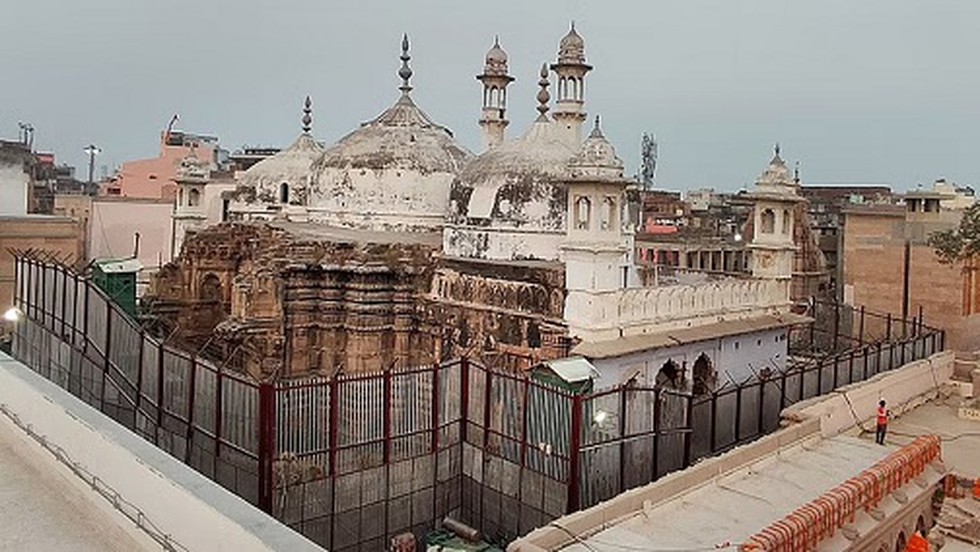
About:
- District judge A.K. Vishvesha ruled that neither the Places of Worship Act, 1991, nor the Waqf Act, 1995, nor the U.P. Shri Kashi Vishwanath Temple Act, 1983, bar the suit and that the “plaintiffs will have right to prove their averments by cogent evidence”. The next hearing is slated for September 22.
- The suit, filed by Rakhi Singh and four other women, claimed Hindus had been worshipping Maa Shringar Gauri, Lord Ganesha and other visible and invisible deities daily at the said property till as recently as 1993, after which the Uttar Pradesh government restricted the worship to one day a year.
- The court noted that the suit filed by the Hindu women “is limited and confined to the right of worship as a civil right and fundamental right as well as customary and religious right”.
- The court emphasised that the suit neither sought a declaration or injunction over the property in question, nor did it seek the conversion of the mosque into a temple.
Source : The Hindu
2. EWS QUOTA
The Supreme Court will examine whether The Constitution (103rd Amendment) Act, which introduced a 10 per cent quota for Economically Weaker Sections (EWS) in government jobs and admissions, violates the basic structure of the Constitution.
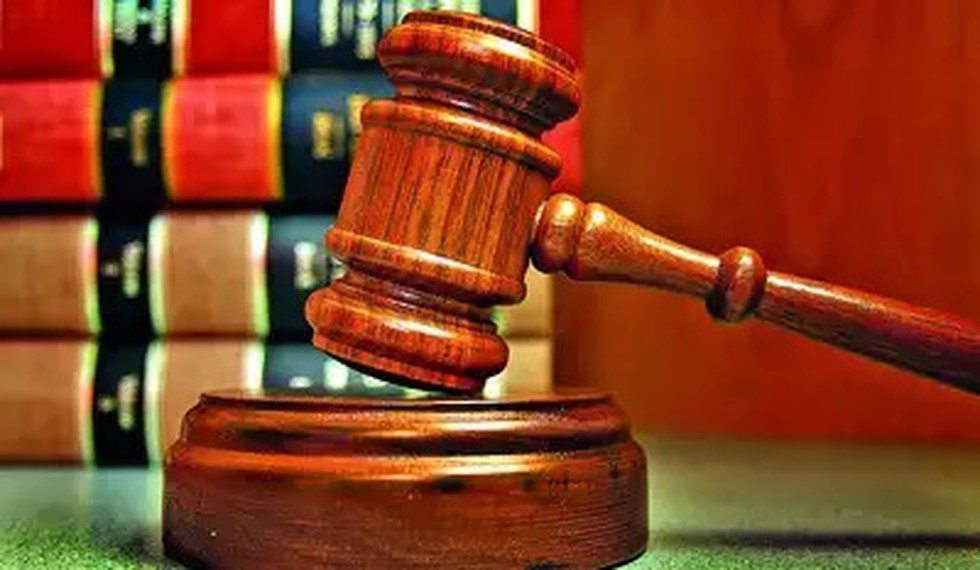
About:
- A five-judge Constitution Bench led by Chief Justice of India (CJI) U U Lalit decided to examine the following three key issues to ascertain the validity of the amendment:
- “Whether the 103rd Constitution Amendment can be said to breach the basic structure of the Constitution by permitting the state to make special provisions, including reservation, based on economic criteria”;
- “Whether it (the amendment) can be said to breach the basic structure…by permitting the state to make special provisions in relation to admission to private unaided institutions”;
- “Whether the basic structure is violated by “excluding the SEBCs (Socially and Educationally Backward Classes)/ OBCs (Other Backward Classes)/ SCs (Scheduled Castes)/ STs (Scheduled Tribes) from the scope of EWS reservation”.
- The 103rd Amendment inserted Articles 15(6) and 16(6) in the Constitution to provide up to 10 per cent reservation to EWS other than backward classes, SCs, and STs in higher educational institutions and initial recruitment in government jobs.
Source: Indian Express
3. G7’s PRICE CAP ON RUSSIAN OIL
The Group of Seven countries is working to cap the price of Russian oil in an attempt to limit Moscow’s ability to fund its invasion of Ukraine, a plan analysts say could work in the long term but might boost oil prices in coming months.

About:
- The G7 wealthy nations – the United States, Japan, Germany, Britain, France, Italy and Canada – and the EU are hammering out details of the plan. The G7 wants to enlist other countries, including India and China, which have been snapping up heavily-discounted oil from Russia since its Feb. 24 invasion of Ukraine
- Russia has managed to maintain its revenues through those increased crude sales to India and China. But even if India and China don’t join, a cap could help force down prices for Asia and other consumers.
Source : Indian Express
4. RETAIL INFLATION
India’s retail inflation resurged to 7% in August from 6.71% in July, fuelled by a 7.62% uptick in food prices paid by consumers, even as industrial output growth in July dropped to the lowest level since April at just 2.4%, with output levels dropping 2.75% month on month.
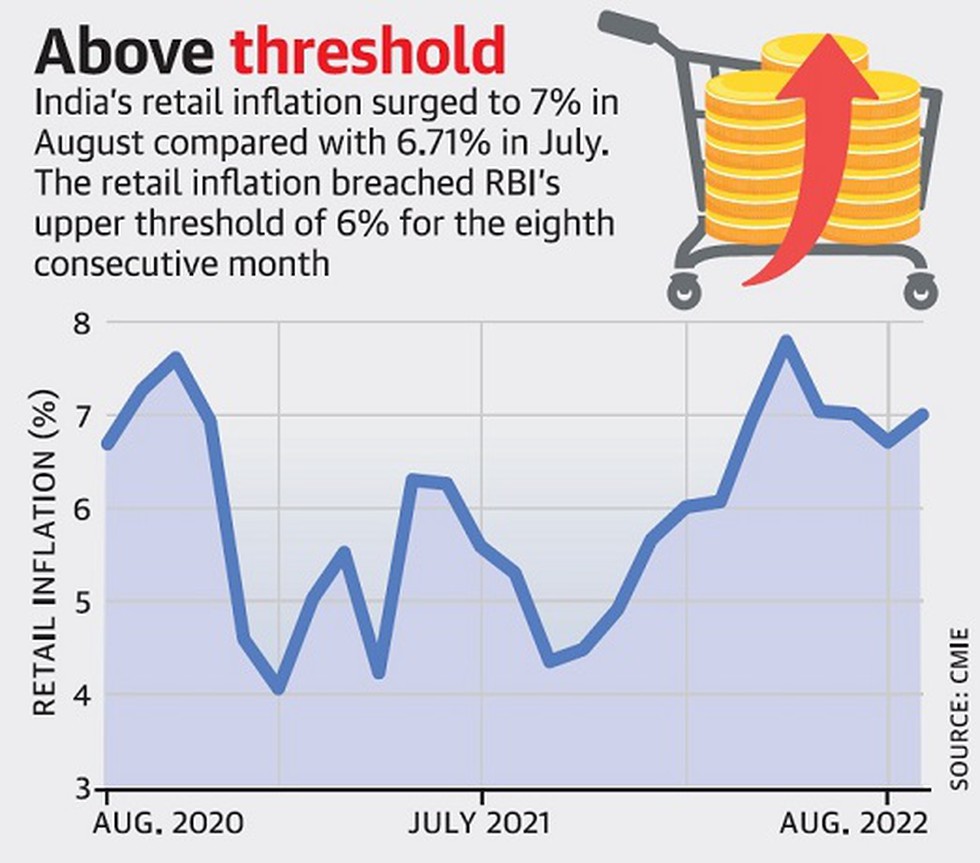
About:
- This is the eighth successive month that retail inflation has stayed above the central bank’s upper tolerance threshold of 6% inflation for the economy, and constitutes a setback to households’ spending power among the poorer sections.
- Rural inflation that was at 6.8% in July, saw a sharper rise than urban inflation in August, rising to 7.15%. Urban consumers’ inflation rate moved up from 6.49% in July to 6.72%.
- The uptick in inflation was largely driven by “a broad-based rise across the food segment”, with a higher inflation in cereals, pulses, milk, fruits, vegetables and prepared meals and snacks.
Source : The Hindu
5. JUDICIAL APPOINTMENTS
The Supreme Court Collegium led by Chief Justice of India (CJI) U.U. Lalit has recommended eight names for appointment to the Bombay High Court. Six of them are judicial officers and two are advocates.
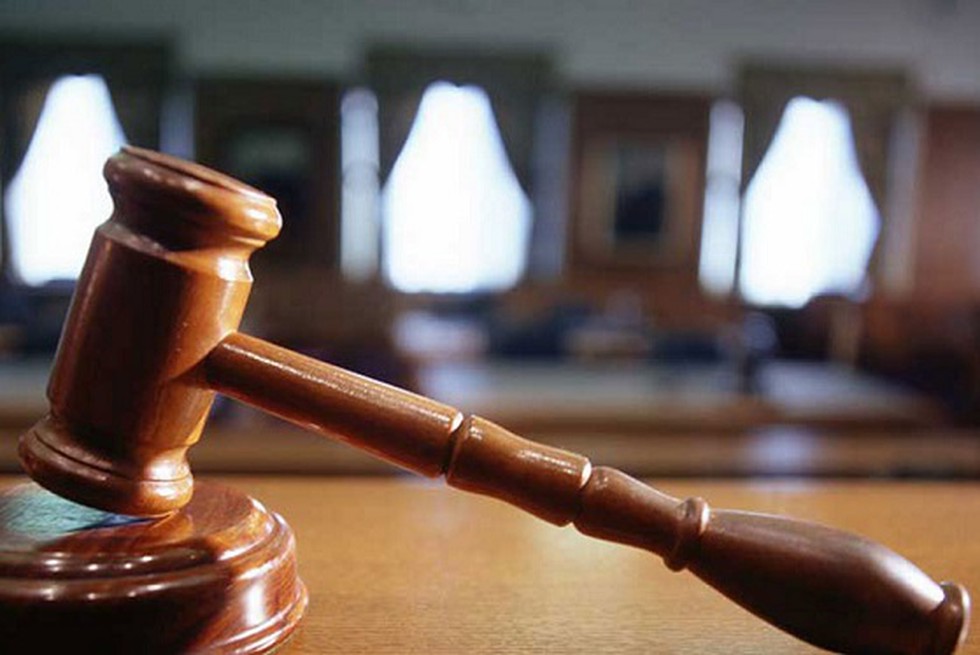
About:
- If the government agrees with the Collegium, the judicial strength in the Bombay High Court will rise to 68 out of a total sanctioned strength of 94 judges.
- The Indian Judicial collegium system, where existing judges appoint judges to the nation's constitutional courts, has its genesis in, and continued basis resting on, three of its own judgments made by Supreme Court judges which are collectively known as the Three Judges Cases.
- Following are the three cases:
- P. Gupta v. Union of India - 1981 (also known as the Judges' Transfer case)
- Supreme Court Advocates-on Record Association vs Union of India - 1993
- In re Special Reference 1 of 1998
Source: The Hindu
6. PORNOGRAPHY
The Supreme Court did not entertain a plea advocating a link between watching Internet porn and sex crimes, including child abuse.
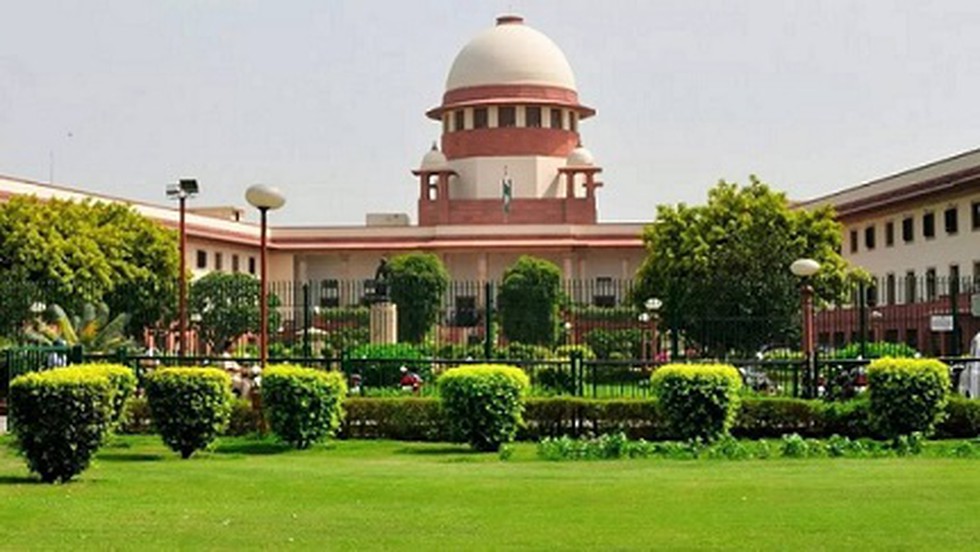
About:
- It said child sex abuse was a crime by itself. Investigation into individual cases by the police would reveal whether or not viewing of pornography had triggered the crime. That aspect would be part of evidence of each individual case.
- “Seeking a judicial declaration from the Supreme Court that porn on the Internet has led to child sex crimes would be equal to giving a go-ahead to online surveillance,” it said.
- The selling and distribution of pornographic material is illegal in India under section 292 of IPC.
- Child pornography is illegal and strictly prohibited across the country under section 67B of the Information Technology Act, 2000.
- however, viewing sexually explicit material in private spaces is not illegal. The Supreme Court had also orally remarked back in July 2015 that it cannot stop an adult from exercising his fundamental right to personal liberty to watch porn within the privacy of his room.
Source: The Hindu
7. BACHELOR OF DENTAL SURGERY (BDS)
For the first time in 74 years, the Bachelor of Dental Surgery (BDS) curriculum is all set for an overhaul.
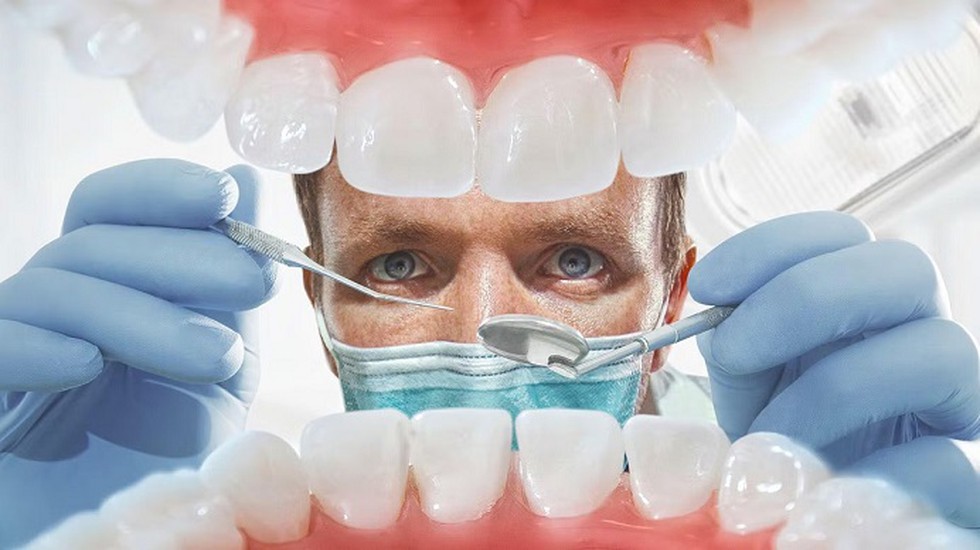
About:
- The decision by the Dental Council of India, which falls under the Union Health Ministry, is aimed at bringing the undergraduate course on a par with global standards, while making it more job-oriented and up to date.
- At present the BDS is a five-year course, which comprises four-year academics and one year of internship.
- The proposed credit-based curriculum will be a five-and-a-half-year course, which consists of four-and-a-half years of academics and one year of rotational internship.
- The exam pattern will shift from yearly to semester system where the student has the option to pick from the 50 to 60 elective subjects offered alongside.
Source : The Hindu





























































































































































.png)
.png)
.png)
.png)
.png)


.png)
.png)
.png)





.png)
.png)






.png)
.png)
.png)
.png)
.png)
.png)
.png)
.png)
.png)

.png)







.png)
.png)


.png)
.png)
.png)


.png)

.png)
.png)





.jpg)

.png)
.png)


.png)

.png)
.png)
.png)

.jpg)

.jpg)


.png)

.png)
.png)
.png)
.png)
.png)
.png)
.png)
.png)
.png)
.png)




.png)

.png)





.png)
.png)
.png)
.png)
.png)
.png)
.png)
.png)
.png)
.png)
.jpg)
.jpg)

.png)
.png)
.png)
.png)
.png)
.png)
.png)
.png)
.png)
.png)
.png)
.png)
.png)
.png)
.png)
.png)
.png)
.png)
.png)
.png)
.png)
.png)



.png)
.png)

.jpg)
.jpg)


.jpg)
.jpg)
.jpg)
.jpg)
.jpg)

.jpg)








.jpg)
.jpg)
.jpg)
.jpg)
.jpg)

















.jpg)
.jpg)







.jpg)


















.jpg)
.jpg)



























































































.jpg)
.jpg)


























.jpg)

.jpg)










.jpg)








.jpg)




.jpg)










.jpg)


















.jpg)












































.jpg)














.jpg)
.jpg)
.jpg)





.jpg)

.jpg)
.jpg)





































































.jpg)


































.jpg)
.jpg)
















































.jpg)












.jpg)


.jpg)




.jpg)
.jpg)
.jpg)

.jpg)
.jpg)
.jpg)
.jpg)

.jpg)
.jpg)
.jpg)

.jpg)
.jpg)
.jpg)
.jpg)
.jpg)
.jpg)
.jpg)
.jpg)

.jpg)


.jpg)
.jpg)
.jpg)
.jpg)
.jpg)
.jpg)
.jpg)
.jpg)
.jpg)
.jpg)











.jpg)
.jpg)





.jpg)
.jpg)
.jpg)
























.jpg)
























.jpg)









.jpg)
.jpg)







.jpg)
.jpg)









































.jpg)
.jpg)
.jpg)
.jpg)
.jpg)

.jpg)
.jpg)
.jpg)
.jpg)
.jpg)


.jpg)
.jpg)
.jpg)
.jpg)
.jpg)

.jpg)
.jpg)
.jpg)
.jpg)
.jpg)
.jpg)
.jpg)
.jpg)
.jpg)
.jpg)
.png)

.png)
.png)

.png)
.png)
.png)
.png)


.jpg)
.jpg)

.jpg)
.jpg)
.jpg)

.png)
.png)
.png)
.png)
.png)
.png)
.png)

.png)
.png)
.png)
.png)
.png)
.png)
.png)
.png)
.png)
.png)





































































-min.png)



.png)




.png)








































